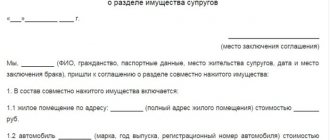Definition of a marriage contract
A prenuptial agreement is a written agreement between spouses in which they consider their property relations within the framework of the marriage union. Thus, in contrast to the distribution of the property mass legally, spouses have the opportunity to independently determine the ownership of this or that property.
This document (nuptial agreement) regulates the property relations of the spouses. By concluding a marriage contract, a married couple independently establishes rights to joint property in accordance with their wishes.
Registration of a marriage contract allows you to regulate the following issues:
- distribution of family costs;
- determining the share of each spouse in the family income;
- regulation of property division during divorce proceedings;
- establishing the rules and responsibilities of spouses within the framework of a marriage.
All issues related to the concept of a marriage contract are considered in the Family Code, namely in Articles 40-46. Based on Articles 40 and 42, spouses are given the right to change the regime of joint ownership and establish a regime of ownership of property in the event of divorce.
Art. 41 clause 1 of the RF IC states that a marriage contract can be concluded both before the wedding and at the time of marriage. The only condition is that both spouses voluntarily take part in signing the agreement.
The marriage contract is concluded exclusively in writing. It also needs notarization on the basis of Article 41, paragraph 2 of the Insurance Code.
How does a prenuptial agreement differ from an agreement on the division of marital property?
Lawyer Antonov A.P.
A marriage contract, in contrast to an agreement on the division of property of spouses, can be concluded before the registration of marriage, establish a regime of common joint property, regulate the regime of future property and be broader in content.
Moment of conclusion
A marriage contract can be concluded before the state registration of a marriage (in this case, it begins to be valid from the moment of marriage) or at any time during the marriage (Clause 1 of Article 41 of the RF IC). An agreement on the division of property of spouses can be concluded during the marriage or after its dissolution. Based on this, a marriage contract can be concluded by persons entering into marriage or spouses, and an agreement on the division of property can be concluded by spouses or former spouses.
Form and necessity of notarization
A marriage contract is an agreement between the persons entering into marriage or an agreement between the spouses that defines the property rights and obligations of the spouses during the marriage and (or) in the event of its dissolution. The marriage contract is concluded in writing and must be notarized (Article 40, paragraph 2 of Article 41 of the RF IC).
An agreement on the division of common property of spouses acquired during marriage is also concluded in writing and must be notarized. At the same time, failure to comply with the notarial form of the transaction entails its nullity (clause 2 of article 38 of the RF IC; clause 3 of article 163 of the Civil Code of the Russian Federation). For notarization of a marriage contract and an agreement on the division of common property of spouses acquired during marriage, you must pay a state fee (notarial fee - when applying to a private notary). In the case of certification of a transaction by two notaries (without the joint presence of the parties), the notarial fee is charged by each notary (Parts 1, 2, 6, Article 22, Article 53.1 of the Fundamentals of the Legislation of the Russian Federation on Notaries).
Established property modes
In a marriage contract, you can establish a regime of common joint, common shared or separate property. In an agreement on the division of property, only the regime of common shared or separate ownership can be established.
Property in respect of which an agreement or contract is concluded
A prenuptial agreement may regulate the treatment of property that will be acquired in the future. For example, a prenuptial agreement may provide that all real estate acquired during marriage will be considered the property of the spouse in whose name it was acquired. Also, the marriage contract can also change the personal property regime of the spouses - in terms of property that was acquired by them before marriage (Clause 1 of Article 42 of the RF IC). The property division agreement defines the property rights and obligations of the spouses in relation to the property they already own.
Other differences
The content of a marriage contract may be broader than an agreement on the division of property. In a marriage contract, spouses have the right to define their rights and obligations for mutual maintenance, ways of participating in each other’s income, the procedure for each of them to bear family expenses, determine the property that will be transferred to each of the spouses in the event of divorce, and also include in the marriage contract any other provisions relating to property relations of spouses (clause 1 of article 42 of the RF IC).
Note. Issues regarding the maintenance and upbringing of children cannot be contained in any of these agreements (Clause 3 of Article 42 of the RF IC).
Sincerely, lawyer Anatoly Antonov, managing partner of the law firm Antonov and Partners.
Still have questions for your lawyer?
Ask them right now here, or call us by phone in Moscow +7 (499) 288-34-32 or in Samara +7 (846) 212-99-71 (24 hours a day), or come to our office for a consultation (by pre-registration)!
The essence of the marriage contract
Concluding a marriage contract is a common practice. And despite the fact that this type of agreement has not yet become widespread in our country, more and more people are becoming convinced of its effectiveness. The institution of a marriage contract is widespread in the countries of the Western world, and it was from there that it came to our country.
A prenuptial agreement is a written document that is signed by both spouses and defines their property relations. The essence of the marriage contract is that it defines and establishes the ownership regime of the entire property estate of the married couple. At the same time, the marriage contract concerns not only existing property, but may also address issues of distribution of those property values that may appear in the family in the foreseeable future.
Similarities between a marriage contract and an agreement on the division of marital property
Both agreements, as a rule, are concluded for the purpose of determining the fate of the jointly acquired property of the spouses, in other words, for the purpose of dividing property.
Both the division agreement and the marriage contract may state that, for example, an apartment acquired during marriage is the property of the spouse, and a plot of land (dacha), which is also property jointly acquired by both spouses, becomes the personal property of the second spouse.
The fate of movable things (vehicles, household appliances, furniture, other property) is determined similarly. Perhaps this is where the similarities end.
How to draw up a marriage contract. Form of marriage contract
The content of the marriage contract is regulated at the legislative level, namely Article 42 of the Family Code. In accordance with this provision, spouses have the full right to change the regime of joint ownership, both for individual assets and for all property as a whole.
Like any other official document, a marriage contract comes into force only after a notary’s visa appears on it.
In addition, the state assumes that in some cases the marriage contract may be subject to termination or modification. This can happen in two ways: by agreement of the parties and through the court.
Changes and termination of the marriage contract are regulated by Art. 43 RF IC. Basically, changes to the marriage contract are due to the following reasons:
- if the terms of the agreement at some point become unacceptable to one of the spouses;
- if new circumstances arise, for example, the welfare of one spouse increases sharply, but in accordance with the agreement, his property is mostly managed by the second spouse;
- if there is a violation of the established rules of the marriage agreement.
Speaking about how to draw up a marriage contract, it should be noted that the form of this document, in accordance with legal requirements, can only be written. In addition, the agreement must be certified by a notary, otherwise it will be considered invalid.
Form and necessity of notarization
A marriage contract is an agreement between the persons entering into marriage or an agreement between the spouses that defines the property rights and obligations of the spouses during the marriage and (or) in the event of its dissolution. The marriage contract is concluded in writing and must be notarized (Article 40, paragraph 2 of Article 41 of the RF IC).
Note! In connection with the coronavirus infection, the work of notaries is carried out taking into account the sanitary and epidemiological situation. We recommend that you clarify the work procedure in advance (clause 1 of Decree of the President of the Russian Federation of May 11, 2020 N 316).
An agreement on the division of common property of spouses acquired during marriage is also concluded in writing and must be notarized. At the same time, failure to comply with the notarial form of the transaction entails its nullity (clause 2 of article 38 of the RF IC; clause 3 of article 163 of the Civil Code of the Russian Federation).
For notarization of a marriage contract and an agreement on the division of common property of spouses acquired during marriage, it is necessary to pay a state fee (notarial fee - when applying to a private notary) (Parts 1, 2 of Article 22 of the Fundamentals of the Legislation of the Russian Federation on Notaries).
Termination of the marriage agreement
With the advent of a marriage contract in domestic legal practice, many people have difficulties understanding the essence of this agreement. For our country, a marriage contract is exotic, so the registration of a marriage contract is only gaining momentum.
The rules of civil and family law apply to the marriage contract. Taking into account this fact, the amendment and termination of the marriage contract is regulated by the norms of civil law provided for in accordance with Article 450-453 of the Civil Code of the Russian Federation.
Currently, termination of a marriage contract can be achieved in two ways:
- with the voluntary consent of both spouses to terminate the document;
- in court when submitting a written statement from one of the spouses.
As a rule, most cases of contract termination go through the millstones of judicial practice. The court may make a positive decision based on the following facts:
- if one of the spouses has not fulfilled his obligations under the agreement;
- if both spouses do not object to the termination of the contract and justify their decision by the presence of certain circumstances. For example, they decide to make changes to the agreement regarding alimony payments in the event of a divorce, or their financial situation has changed significantly, which was not provided for by the terms of the agreement.
A positive outcome of the trial will be achieved, and the marriage contract will be terminated if:
- the second spouse voluntarily agrees to terminate the contract;
- if the reaction from the second spouse is not received within the period established in the contractf. In this case, the contract will be considered terminated after 30 days from the date of filing the application in accordance with the provisions of Article 452 of the Civil Code of the Russian Federation.
Differences between a marriage contract and an agreement on the division of property of spouses
Form of contract and agreement
An agreement on the division of property of the spouses is concluded in simple written form (its notarization is at the request of the spouses), while a marriage contract is subject to notarization and failure to comply with the form entails the invalidity of the marriage contract.
Period of concluding a contract and agreement (possibility of concluding before marriage, during marriage and after divorce)
A marriage contract can be concluded both before the state registration of marriage (begins to be valid in this case from the moment of marriage), and at any time during the marriage. An agreement on the division of property of spouses can be concluded not only during the marriage, but also after its dissolution. Thus, a prenuptial agreement cannot be concluded after the termination of a marriage, and a separation agreement cannot be concluded before the marriage.
It is worth mentioning the existing point of view, according to which, “division by agreement is possible between spouses; division of property after divorce can only be carried out by the court... The division of property by agreement is spoken of only in relation to spouses, i.e. persons who are married at the time of conclusion of the agreement. Consequently, this type of contract can only be used by spouses during marriage, i.e. until its termination."
One can hardly agree with this position. Article 38 of the RF IC states that “the division of the common property of the spouses can be made both during the marriage and after its dissolution at the request of any of the spouses... The common property of the spouses can be divided between the spouses by agreement.” The fact that these norms do not indicate “former spouses” cannot be an obstacle to concluding an agreement after divorce, because There is an indication of this possibility in the same Article 38 of the RF IC. In addition, it should be taken into account that the right to go to court is associated with the presence of a violated or disputed right, and if the former spouses reach agreement on the issue of division of property, there is no need for judicial protection. Such an agreement will not contradict the general provisions of the Civil Code of the Russian Federation on transactions (see also, for example, the Appeal ruling of the Moscow City Court dated June 14, 2012 in case No. 11-7843, the Appeal ruling of the Murmansk Regional Court dated October 10, 2012 N 33-2684-2012 , in which the court, when making court decisions, was guided by an agreement on the division of property of the spouses, concluded after the divorce).
Conclusion of a contract and agreement regarding property acquired in the future
The provisions of the Family Code of the Russian Federation allow spouses in a marriage contract to change the regime of common ownership of property acquired in the future. For example, the contract may contain the following condition: “real estate acquired in the future will be the property of the spouse’s full name”). However, we should not forget about the norm of Article 44 of the RF IC, according to which the court can also declare a marriage contract invalid in whole or in part at the request of one of the spouses, if the terms of the contract put this spouse in an extremely unfavorable position.
An agreement on the division of property of spouses cannot contain conditions on the division of property acquired in the future. Only property already acquired at the time of its conclusion is subject to division under the agreement.
Contents of the marriage contract and separation agreement
In a marriage contract, by virtue of Article 42 of the RF Family Code, spouses have the right to determine their rights and obligations regarding mutual maintenance, ways of participating in each other’s income, and the procedure for each of them to bear family expenses; determine the property that will be transferred to each spouse in the event of divorce, and also include in the marriage contract any other provisions relating to the property relations of the spouses.
In an agreement on the division of property, spouses only divide property that is their common property. The definition of the rights and obligations of the spouses is not included in the subject of the agreement.
Possibility in the marriage contract and separation agreement to change the regime of personal ownership of property
In a marriage contract, the parties have the right to change the regime of personal property. For example, before marriage, the spouse owned an apartment and a car. The parties to the marriage contract have the right to indicate that the property that was the property of one of the spouses before marriage is, by virtue of this contract, the common property of the spouses, full name.”
Such conditions cannot be stipulated in an agreement on the division of marital property. The division agreement pursues the goal of dividing only jointly acquired property, while changing the regime of personal property to common property covers a transaction of donation of property by one of the spouses to the other spouse. However, a donation cannot be the subject of a division agreement.
Invalidation of a marriage contract and separation agreement
Both the marriage contract and the agreement on the division of property of the spouses, being transactions, can be declared invalid by the court at the request of the party.
The general grounds for declaring transactions invalid are established by the Civil Code of the Russian Federation. For example, a marriage contract or a separation agreement may be declared invalid as a transaction made by a citizen recognized as incompetent, a transaction made by a citizen whose legal capacity is limited by a court, a transaction made by a citizen unable to understand the meaning of his actions or manage them, a transaction made under under the influence of delusion, a transaction made under the influence of deception, violence, threat or a combination of difficult circumstances.
However, in addition to these general grounds, a marriage contract can also be declared invalid by the court on the basis specified in Article 44 of the RF IC, which states that the court can also declare a marriage contract invalid in whole or in part at the request of one of the spouses, if the terms of the contract require this spouse is in an extremely unfavorable position. The terms of the marriage contract that violate other requirements of paragraph 3 of Article 42 of this Code are void.
Paragraph 3 of Article 42 of the RF IC states that a marriage contract cannot limit the legal capacity or capacity of spouses, their right to go to court to protect their rights; regulate personal non-property relations between spouses, the rights and obligations of spouses in relation to children; provide for provisions limiting the right of a disabled, needy spouse to receive maintenance; contain other conditions that place one of the spouses in an extremely unfavorable position or contradict the basic principles of family law.
Alexander Otrokhov, Legal (Omsk), 03/06/2013
Recommended publications:
- Marriage agreement, agreement on division of property of spouses and guarantees of creditors' rights
- Division of jointly acquired property of spouses and cohabitants, division of loan debts
- Division of jointly acquired real estate of spouses (apartment acquired during marriage and before marriage)
- Divorce, division of property and credit obligations of spouses. Generalization of judicial practice
- On divorce and the possibility of registering the ownership of an apartment purchased with a mortgage as the property of one of the spouses
Sample documents on the topic:
- Agreement on the division of common property of spouses
- Agreements on the division of common property of spouses. Sample
- Marriage agreement (sample) establishing the regime of separate ownership of property and income
- Marriage agreement (sample) according to which the apartment acquired by the spouses during the marriage is transferred to the personal ownership of one of the spouses, the other spouse receives all other property, including those acquired in the future
- Statement of claim for invalidation of an agreement on the division of property of spouses
Invalidation of a marriage contract
As a rule, such an important step as drawing up a marriage contract is taken by people who are independent in terms of their financial situation and clearly understand the legal consequences of this document. At the same time, the main conditions for concluding a marriage contract are the voluntary consent of both spouses, as well as mandatory registration with a notary. The cost of notary services may vary slightly, so it is inappropriate to talk about it.
Article 44, paragraph 1 of the RF IC states that a marriage contract is a civil document, and, therefore, a marriage contract can be declared invalid through the court. However, in practice this is extremely rare.
You can challenge a marriage contract if the following circumstances occur:
- if the document has not been registered with a notary;
- if the agreement was recognized as an imaginary transaction that was concluded to conceal another transaction or was executed without the intention of achieving certain legal consequences (Article 170 of the Civil Code of the Russian Federation);
- if the agreement was concluded with a person who has partial or complete incapacity (Article 171 of the Civil Code of the Russian Federation);
- the text of the agreement contains significant violations of current legal norms and initiatives.
You can challenge a marriage contract only through the court by filing an application indicating reasoned reasons for such a step. In this case, it is better to attract a qualified lawyer to your side, who will help reduce the time for consideration of the application to the maximum and will contribute to the utmost protection of the interests of his client.
Challenging the marriage contract
The term “challenge a marriage” is used in everyday life by both ordinary citizens and lawyers, and means recognizing a marriage as invalid or void. This means that the terms of the prenuptial agreement will be voided.
The institution of a marriage contract is also regulated by civil law, since the contract itself is civil law. Consequently, the challenge will take place in the presence of certain circumstances, among which are:
- if the marriage contract was not certified by a notary;
- if a marriage contract is concluded with an incapacitated citizen;
- if the marriage contract contains conditions that violate current legislation, for example, the duties and rights of one of the spouses are discriminated against, there is a problem with the upbringing and maintenance of a joint child, there is a deprivation of the right to support a disabled spouse, etc.
If the court determines that the marriage contract has the circumstances listed above, then the marriage contract will be declared void, even if in the case where both spouses are satisfied with the wording of the property relations between them.
A marriage agreement can be declared invalid by the court. If you intend to challenge the marriage contract, then you need to prepare a certain package of documents and submit an official application, indicating the reasons for making such a decision. If the court finds your arguments convincing, the contract will be terminated.
Speaking about how to draw up a marriage contract, it should be noted that the form of this document, in accordance with legal requirements, can only be written. In addition, the agreement must be certified by a notary, otherwise it will be considered invalid.
Author of the article
Property in respect of which an agreement or contract is concluded
A prenuptial agreement may regulate the treatment of property that will be acquired in the future. For example, a prenuptial agreement may provide that all real estate acquired during marriage will be considered the property of the spouse in whose name it was acquired. Also, the marriage contract can also change the personal property regime of the spouses - in terms of property that was acquired by them before marriage (Clause 1 of Article 42 of the RF IC). The property division agreement defines the property rights and obligations of the spouses in relation to the property they already own.








